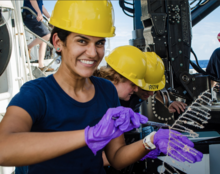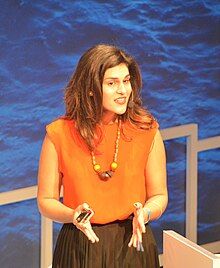Diva Amon
Diva Amon | |
|---|---|
 | |
| Born | Diva Joan Amon |
| Education | St. Joseph's Convent, St. Joseph |
| Alma mater | University of Southampton (MSc, PhD) |
| Scientific career | |
| Institutions | Natural History Museum, London University of Hawaii at Manoa |
| Thesis | Bone-eating worms and wood-eating bivalves: characterising the ecology of deep-sea organic falls from multiple ocean basins (2013) |
| Doctoral advisor | Adrian Glover Jonathan Copley[1] |
| Website | divaamon |

Diva Joan Amon is a marine biologist from Trinidad. She is currently a post-doctoral researcher in the Benioff Ocean Initiative at the University of California, Santa Barbara[2] and a 2022 Pew Marine Fellow.[3] Previously, she was a Marie Skłodowska-Curie Actions (MSCA) Research Fellow at the Natural History Museum, London.[4]
Early life and education
[edit]Amon grew up in Trinidad. She attended St. Joseph's Convent in Port of Spain.[5] Her sister is astrophysicist and cosmologist Dr. Alexandra Amon.[6] She earned a master's degree in marine biology at the University of Southampton in 2009.[7] During her degree she learned that 95% of the deep ocean is unexplored, and decided to stay in this field for her postgraduate studies.[7] During her PhD she took part in I'm a Scientist, Get me out of here!.[5] She completed her doctoral training in chemosynthetic environments under the supervision of Adrian Glover and Jonathan Copley,[1] working between the University of Southampton and the Natural History Museum, London.[8] Her PhD was funded by the graduate school of the National Oceanography Centre scholarship.[9] She studied hydrothermal vents in the Cayman Trough and spent three weeks on the R/V Yokosuka and the DSV Shinkai 6500.[9][10][11][12]
Research and career
[edit]Amon was appointed a postdoctoral research fellow at the University of Hawaii at Manoa in 2013.[13] She was manager of the Abyssal Baseline (ABYSSLINE) project.[14] Her research considered the polymetallic nodules in the Clarion-Clipperton fracture zone.[13][15] She spends between one and three months on board a ship, collecting samples to take back for analysis in her lab.[7] These included megafauna, macrofauna, meiofauna and microbes.[16] She discovered nine new deep-sea species, including anemone and two new sponges.[14][17][18][19][20][21] She was part of the Nautilus Exploration Program.[8]
Amon has taken part in 15 research expeditions.[22] In 2016 she boarded the National Oceanic and Atmospheric Administration ship Okeanos Explorer and explored the deep ocean near the Saint Peter and Saint Paul Archipelago, which was covered in BioGraphic, The Atlantic and Scientific American.[23][24][25][26][27] The live feed from the ship's remotely operated underwater vehicle received 2.7 million views.[9][28] She is the founder of SpeSeas, a non-profit that supports marine research in the Caribbean.[29][30] Her research has been featured in several international newspapers.[31][32][33] She has also contributed to the HuffPost, Gizmodo, the Smithsonian magazine, Scientific American and Business Insider.[34][35][36][37][38][39][40] In 2017 she appeared on the CNN show Wild Discoveries.[41] Amon has featured on the YouTube channel Exploring By the Seat of Your Pants.[42]
In 2018 Amon began a two-year Marie Skłodowska-Curie Research Fellow at the Natural History Museum, London.[43] She is on the advisory board of the Deep-Ocean Stewardship Initiative (DOSI) and All Hands on Deck.[44][45] In July 2018 she won the International Seabed Authority Secretary General's Award for Excellence in Deep Sea Research.[46] In 2022 she was awarded a Pew Fellowship in Marine Conservation.[47]
References
[edit]- ^ a b Amon, Diva Joan (2014). Bone-eating worms and wood-eating bivalves : characterising the ecology of deep-sea organic falls from multiple ocean basins. soton.ac.uk (PhD thesis). University of Southampton. OCLC 872691732. EThOS uk.bl.ethos.588933.

- ^ Diva Amon publications indexed by Google Scholar
- ^ "Diva Amon, Ph.D." The Pew Charitable Trusts. Retrieved 3 July 2022.
- ^ "Dr. Diva Amon earns the inaugural ISA Secretary-General's Award for Excellence in Deep-sea Research". DSM Observer. 14 August 2018. Retrieved 3 July 2022.
- ^ a b "Profile – Yttrium Zone". Yttrium Zone. Retrieved 2018-08-14.
- ^ "Love with logic". Newsday. Retrieved 2021-08-24.
- ^ a b c "Deep-sea biologist and postdoctoral fellow: Diva Amon | Prospects.ac.uk". prospects.ac.uk. Retrieved 2018-08-14.
- ^ a b "Diva Amon". Nautilus Live. 26 September 2014. Retrieved 2018-08-14.
- ^ a b c "Diva Amon | Ocean and Earth Science, National Oceanography Centre Southampton | University of Southampton". southampton.ac.uk. Retrieved 2018-08-14.
- ^ "YOKOSUKA < Research Vessels and Vehicles < Research Vessels, Facilities and Equipment < About JAMSTEC < JAMSTEC". jamstec.go.jp. Retrieved 2018-08-14.
- ^ Sumida, Paulo Y. G.; Alfaro-Lucas, Joan M.; Shimabukuro, Mauricio; Kitazato, Hiroshi; Perez, Jose A. A.; Soares-Gomes, Abilio; Toyofuku, Takashi; Lima, Andre O. S.; Ara, Koichi (2016-02-24). "Deep-sea whale fall fauna from the Atlantic resembles that of the Pacific Ocean". Scientific Reports. 6 (1): 22139. Bibcode:2016NatSR...622139S. doi:10.1038/srep22139. ISSN 2045-2322. PMC 4764926. PMID 26907101.
- ^ "Deep-sea shipworms revealed by micro-CT scans". nhm.ac.uk. Retrieved 2018-08-14.
- ^ a b "Diva Amon – Schmidt Ocean Institute". Schmidt Ocean Institute. Retrieved 2018-08-14.
- ^ a b "More Surprises from the Deep Sea". VOA. Retrieved 2018-08-14.
- ^ Amon, Diva; Ziegler, Amanda; Kremenetskaia, Antonina; Mah, Christopher; Mooi, Rich; O'Hara, Tim; Pawson, David; Roux, Michel; Smith, Craig (2017-05-11). "Megafauna of the UKSRL exploration contract area and eastern Clarion-Clipperton Zone in the Pacific Ocean: Echinodermata". Biodiversity Data Journal. 5 (5): e11794. doi:10.3897/BDJ.5.e11794. ISSN 1314-2828. PMC 5515089. PMID 28765722.
- ^ "Past Research". Craig Smith's Benthic Ecology Lab. 2015-06-09. Retrieved 2018-08-14.
- ^ "Antarctica's first whale skeleton found with 9 new deep-sea species". EurekAlert!. Retrieved 2018-08-14.
- ^ Lim, Xiaozhi (5 October 2017). "New Species of Sponges Found on the Pacific Seafloor". The New York Times. Retrieved 2018-08-14.
- ^ MACPHERSON, ENRIQUE; AMON, DIVA; CLARK, PAUL F. (2014-01-07). "A new species of Munidopsis from a seamount of the Southwest Indian Ocean Ridge (Decapoda: Munidopsidae)". Zootaxa. 3753 (3): 291–296. doi:10.11646/zootaxa.3753.3.8. ISSN 1175-5334. PMID 24872299.
- ^ Dadson, Nanabanyin (2014-01-13). Graphic Showbiz: Issue 863 January 13-15, 2014. Graphic Communications Group.
- ^ Deep-Sea Research Part II: Topical Studies in Oceanography.
- ^ "Expeditions". Diva Amon. 2015-06-19. Retrieved 2018-08-14.
- ^ US Department of Commerce, National Oceanic and Atmospheric Administration. "NOAA Ship Okeanos Explorer: Gulf of Mexico 2017: Explorers: NOAA Office of Ocean Exploration and Research". Retrieved 2018-08-14.
- ^ bioGraphic Magazine (2017-11-22), Into the Deep Unknown, retrieved 2018-08-14
- ^ "Life on the Rocks". Retrieved 2018-08-14.
- ^ Nestor, James (2017-11-30). "Searching for the Origins of Life Thousands of Feet Underwater". The Atlantic. Retrieved 2018-08-14.
- ^ Nestor, James. "Life on the Rocks". Scientific American. Retrieved 2018-08-14.
- ^ "Deep Ocean – Global Foundation for Ocean Exploration". engineeringfordiscovery.org. Retrieved 2018-08-14.
- ^ "SpeSeas". SpeSeas. Retrieved 2018-08-14.
- ^ "THE SPESEAS TEAM". SpeSeas. 2017-09-25. Retrieved 2018-08-14.
- ^ "NOAA's Okeanos Explorer in the Marianas Trench". Los Angeles Times. Retrieved 2018-08-14.
- ^ Hunt, Elle (2016-05-06). "Mariana trench live feed: engrossing viewing from deepest place on Earth". The Guardian. Retrieved 2018-08-14.
- ^ "Trinidad and Tobago Guardian : January 26th 2014, Page 72". digital.guardian.co.tt. Retrieved 2018-08-14.
- ^ Daley, Jason. "Future Deep Sea Mining Sites Are Bursting With Rare Marine Species". Smithsonian. Retrieved 2018-08-14.
- ^ Frazer, Jennifer. "A Jellyfish So Surreal That It Looks Unreal Is Discovered on the Enigma Seamount". Scientific American Blog Network. Retrieved 2018-08-14.
- ^ "Sites targeted for deep-sea mining teeming with new species". news.mongabay.com. 9 August 2016. Retrieved 2018-08-14.
- ^ "A New Threat to Oceans: Deep-Sea Mining for Precious Metals". Pulitzer Center. 2016-12-07. Retrieved 2018-08-14.
- ^ "Proposed deep-sea mining region discovered to be rich in new life". MNN – Mother Nature Network. Retrieved 2018-08-14.
- ^ Stone, Maddie. "An Enormous Deep Sea 'Desert' Is Teeming With New Forms of Life". Gizmodo. Retrieved 2018-08-14.
- ^ "Dead Whale Contains a Bounty of Life". 2013-03-19. Archived from the original on March 20, 2013. Retrieved 2018-08-14.
- ^ Dean R. Lomax – Life as a palaeontologist (2017-09-18), Scientists discuss living and extinct species – CNN Inspirations: Wild Discoveries (2017), retrieved 2018-08-14
- ^ Exploring by the Seat of Your Pants (2018-06-06), Diva Amon | Deep-sea Biologist, retrieved 2018-08-14
- ^ "How Seafaring Scientists Are Mapping The Deep". Science Friday. Retrieved 2018-08-14.
- ^ "Executive Committee & Advisory Board". All Hands on Deck. Retrieved 2018-08-14.
- ^ "Management". dosi-project.org. Retrieved 2018-08-14.
- ^ Thompson, Kimone (2018-07-27). "T&T; woman wins international deep-sea research award". Jamaica Observer. Archived from the original on 2018-08-06. Retrieved 2018-08-14.
- ^ "Pew Announces 2022 Marine Fellows". The Pew Charitable Trusts. Retrieved 3 July 2022.
